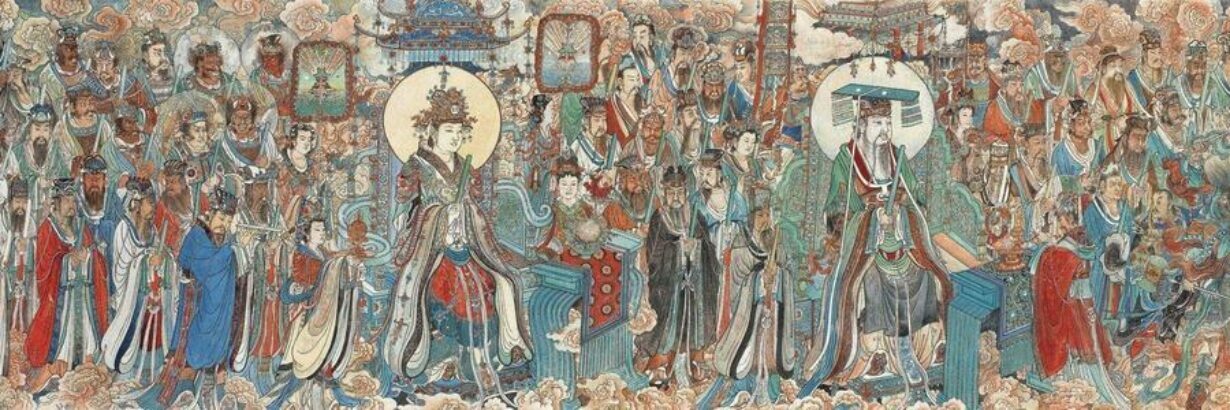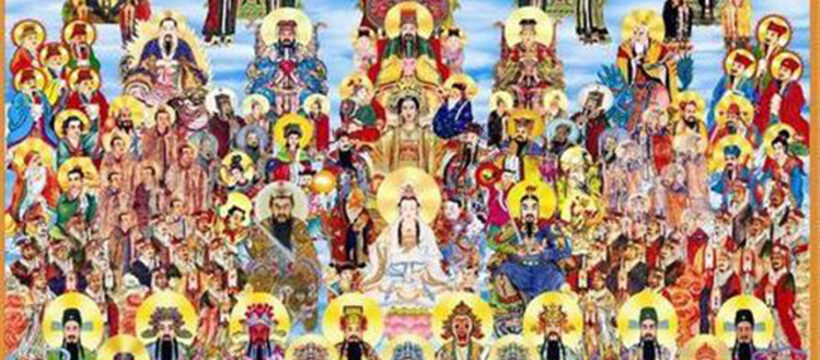Religious Daoism (道教 Daojiao) is the indigenous religion of China that holds longevity and immortality as its highest belief. It advocates attaining longevity (長生 Changsheng) and immortality (成仙 Chengxian) through a process of nourishing life (養生 Yangsheng), cultivation and refinement (修煉 Xiulian), and the practice of virtuous behavior to avoid death and to reach eternity.
Philosophical Daoism (道家 Daojia) is a stream in the history of Chinese philosophy, while religious Daoism is a religion. However, the two are closely related.
The core concept of the Daoist idea “Dao” (道 Dao) was inherited and transformed by the Daoist religion, while Laozi, the founder of the Daoist philosophy, was incorporated into religious Daoism as the “Supreme Venerable Ruler” (太上老君 Taishang Laojun). The “Book of Dao and His Virtue” (道德 經 Daodejing) and the book of Master Zhuang (莊子 Zhuangzi), classics of Daoist philosophy, became the “Perfect Scriptures” (真經 Zhenjing) of religious Daoism. The inheritance and transformation of elements of Daoist philosophy through the Daoist religion shows both the connections between the two and the differences between them. We can say that the value orientations of religious and philosophical Daoism are fundamentally different
According to later scholars, the development of Daoist philosophy can be divided into three stages: Lao-Zhuang Daoist philosophy (老莊 道家 Laozhuang Daojia) of the pre-Qin era; Huang-Lao Daoism (黃老 道 Huanglaodao) of the Qin and Han Dynasties; And the “Science of the Mysteries” (玄學 Xuanxue) Daoist philosophy of the Wei and Jin dynasties. After Wei and Jin, “Philosophical Daoism” became a thing of the past as Daoist philosophy was completely replaced by Daoist religion. Therefore, after the Jin dynasty, the “Daoist School” (道家 Daojia) actually refer to the Daoist religion if it does not specifically name the philosophical Daoism of the pre-Qin, Qin, Han, Wei or Jin dynasties . So we can say
According to the Guide to Chinese Thought, there is no reason to see the Daoist religion as a product of the degeneration and corruption of a pure Daoist philosophy. The relationship between the two should be seen in a different light. The ideological system of the Daoist religion encompasses many aspects that are absent from Daoist philosophy, which are of paramount importance for the practical life of peoples: For example, the Daoist philosophy addresses logic and the mind, while the Daoist religion addresses the emotions, feelings and appeals to the interests of the peoples.
Religious Daoism uses the feeling of fear and mystery of the peoples that are ignored by the philosophical Daoism. “If we look at the differences between religious and philosophical Daoism, we can see that the Daoist religion, although the two complement each other, The practical life of the common people.
To understand Daoism, it is necessary to understand the clear distinction between religious and philosophical Daoism, as well as their intimate relationship.
Written and Translated by Daoist Liu Cheng Yong, German Daoist Association.


There is also a third stream of Daoism, sometimes called Literati Daoism…this was the kind favored by scholars of ancient China who often retired from government service and lived in small huts in the mountains, studying Daoist texts and perhaps practicing meditation…
we dont sepperate the two kinds, 道家 & 道教 exist together. what you mention is parts of both.